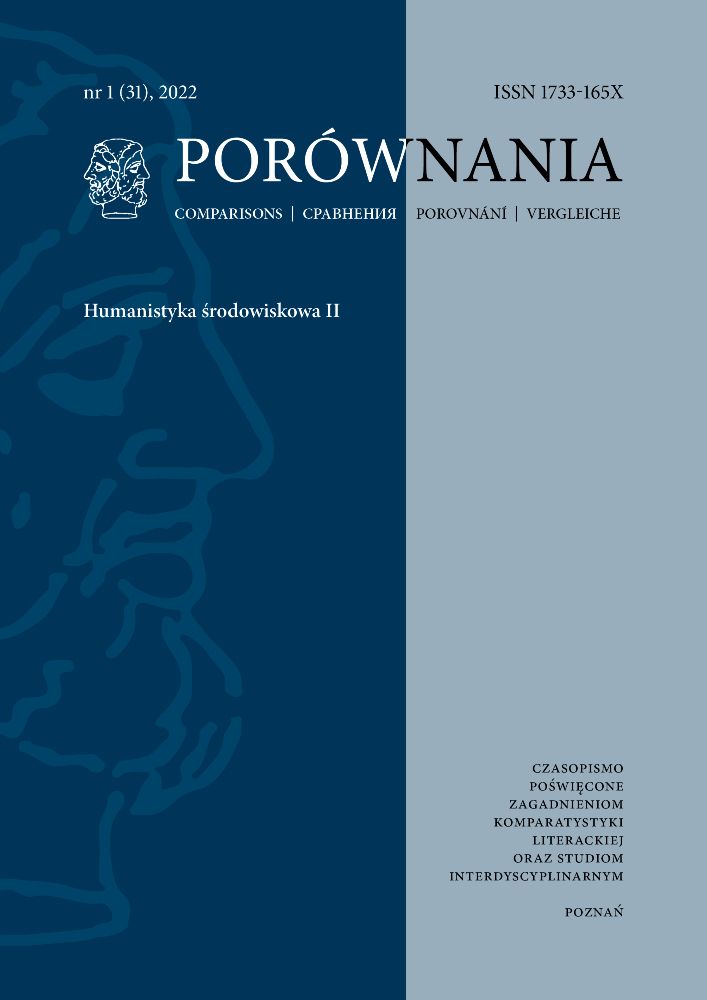Abstract
On the 21st of May 2019 the Anthropocene Working Group has concluded that a new geological era in Earth’s history has begun—the Anthropocene. The author of the article has deduced that an interdisciplinary discourse regarding climate change should not omit human gardening activity. The Anthropocene is called an epoch of repression, short-sightedness and irreversible loss, which is shown in the work of many modern amateur gardeners. The author presents a vision of two gardens: one that has been made in a harmony of human and nature and one that is dominated solely by humans. In her article she contrasts the information from gardening guidebooks with the knowledge of amateur gardeners found in social media. The point of the article is to show the direction of modern gardening. By analysing selected texts, the author seeks an answer to the following question: are the gardeners, who see climate change, able to break out of their apathy and start to work for the environment or will they rather just continue doing what they are doing now?
References
Bańkowski Andrzej (2000), Etymologiczny słownik języka polskiego, Wydawnictwo Naukowe PWN, Warszawa.
Bartmiński Jerzy (2006), Językowe podstawy obrazu świata, Wydawnictwo UMCS, Lublin.
Bińczyk Ewa (2018), Epoka człowieka. Retoryka i marazm antropocenu, Wydawnictwo Naukowe PWN, Warszawa.
Crutzen Paul, Stoermer Eugene (2000), The "Anthropocene", "Global Change Newsletter", nr 41, s. 17-18.
Czartoryska Izabela (1805), Myśli różne o sposobie zakładania ogrodów, Oficyna Wilhelma Bogumiła Korna, Wrocław.
Delumeau Jean (1996), Historia raju. Ogród rozkoszy, przeł. Eligia Bąkowska, Wydawnictwo Aletheia, Warszawa.
Gadamer Hans-Georg (1993), Aktualność piękna. Sztuka jako gra, symbol i święto, przeł. Krystyna Krzemieniowa, Oficyna Naukowa, Warszawa.
Gajda Stanisław (1990), Wprowadzenie do teorii terminu, WSP w Opolu, Opole.
Grzelak Eliza (2008), W poszukiwaniu Edenu. Językowo-kulturowy obraz współczesnego polskiego ogrodu ozdobnego. Kreacja czasu i przestrzeni, Oficyna TUM, Gniezno.
Hobhouse Penelope (2005), Historia ogrodów, przeł. Bożena Mierzejewska, Arkady, Warszawa.
Hurrion Dawid (2021), Klimat dla zmian, "Gardeners' World", nr 3, s. 28-32.
Juszczak Wiesław (1995), Fragmenty. Szkice z teorii i filozofii sztuki, Państwowy Instytut Wydawniczy, Warszawa.
Kiernicka Elżbieta, Wójcik Barbara (2000), Tajemnice ogrodów, Wydawnictwo Dolnośląskie, Wrocław.
Kobielus Stanisław (1997), Człowiek i ogród rajski w kulturze religijnej średniowiecza, Instytut Wydawniczy PAX, Warszawa.
Krzeszowski Tomasz (1994), Parametr aksjologiczny w przedpojęciowych schematach wyobrażeniowych, "Etnolingwistyka", t. 6, s. 31-51.
Loxton Howard, red. (1991), The Garden. A World View. History. Evolution. Design. Practice. Plants and Planting. Furniture and Ornament, THAMES HUDSON, London.
Maguire Kay (2019), Metr kwadratowy dla zapylaczy, "Gardeners' World", nr 2, s. 89-91.
Majdacki Longin (2008), Historia ogrodów, t. 2, Wydawnictwo Naukowe PWN, Warszawa.
Martens Ekkehard, Schnädelbach Herbert, red. (1995), Filozofia. Podstawowe pytania, przeł. Krystyna Krzemieniowa, "Wiedza Powszechna", Warszawa.
Musgrave Toby (2015), Paradise gardens. Spiritual Inspiration and Earthly Expression, Frances Lincoln Limited, London.
"Nowa Maja w ogrodzie", https://tinyurl.com/yc5hfnnr [ dostęp: 13.03.2022 ].
Passmore John (2002), Enwironmentalizm, w: Przewodnik po współczesnej filozofii politycznej, red. Robert Goodin, Filip Petit, przeł. Cezary Cieśliński, Marcin Poręba, Książka i Wiedza, Warszawa, s. 606-627.
Preston Christopher (2012), Beyond the End of Nature. SRM and Two Tales of Artificity for the Anthropocene, "Ethics, Policy and Environment", nr 15 (2), s. 188-201. DOI: https://doi.org/10.1080/21550085.2012.685571
Rosenberg Marc, Nex Sally (2021), Czy jesteś gotowy zrezygnować z torfu?, "Gardeners' World", nr 1, s. 22-24.
Sosnowski Leszek, Wójcik Anna, red. (2004), Wschód, Universitas, Kraków.
License
Utwory opublikowane w czasopiśmie „Porównania”, na platformie Pressto należącej do Uniwersytetu im. Adama Mickiewicza w Poznaniu są udostępniane na licencji Creative Commons Uznanie autorstwa - Bez utworów zależnych 4.0 Międzynarodowe (CC BY-ND 4.0)
Tym samym wszyscy zainteresowani są uprawnieni do korzystania z utworów opublikowanych pod następującymi warunkami:
-
uznania autorstwa — czyli obowiązek podania wraz z rozpowszechnianym utworem informacji o autorstwie, tytule, źródle (odnośniki do oryginalnego utworu, doi) oraz samej licencji
-
bez utworów zależnych — remiksując, przetwarzając lub tworząc na podstawie utworu, nie wolno rozpowszechniać zmodyfikowanych treści.
-
brak dodatkowych ograniczeń — nie można korzystać ze środków prawnych lub technologicznych, które ograniczają innych w korzystaniu z utworu na warunkach określonych w licencji.
Uniwersytet im. Adama Mickiewicza w Poznaniu zachowuje prawo do czasopisma jako całości (układ, forma graficzna, tytuł, projekt okładki, logo itp.).
Autor zachowuje prawa majątkowe, ale udziela zgody Uniwersytetowi im. Adama Mickiewicza w Poznaniu na wykorzystanie dzieła. Autorzy tekstów zakwalifikowanych do publikacji proszeni są o wypełnienie podpisanie i przesłanie umowa (PL) agreement (EN)
Agreement for granting a royalty-free license to works with a commitment to grant a CC sub-license





